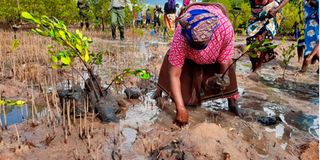Why we should put communities at the heart of nature protection

Residents plant mangrove seedlings in Makongeni, Kwale County, in a bid to boost the protection and conservation of the forests in coast counties.
Most conservation initiatives are playing catch-up: Biodiversity and pristine ecosystems have been lost; all that can be done is the long slog of trying to restore them.
It’s a different story in Africa, which holds a fourth of global biodiversity and still has some intact ecosystems: The Congo Basin Forest, Okavango Delta, reefs and mangroves along our coastlines.... That’s important—when you understand how inextricably linked nature and people are in the African context, where our major occupation remains agriculture and where diverse communities depend on nature for their cultural, physical, spiritual and economic well-being.
The problem is, at an unprecedented rate, we’re losing our biodiversity, water towers and catchments, natural environments that nourish our livelihoods and wellbeing, even the rains that feed our farming and grazing. We are losing half of our agricultural yields.
A shortage of water and degraded environments wreak untold harm on societies, leading to unrest and conflict that will affect everyone. We need to better manage how our lands, freshwater and oceans are used and collectively choose to protect more of them.
Nature protection
Governments, scientists, conservationists and activists converge on Kigali for the inaugural African Protected Areas Congress, at which increasing the area of Africa given over to effective nature protection will be high on the agenda. This is part of a global conversation, including discussions of the 30x30 target: Collectively to protect 30 per cent of the planet’s land and oceans by 2030.
This initiative of the Convention on Biological Diversity, supported by the High Ambition Coalition, is a very ambitious commitment. It has raised divergent perspectives like concerns that it means massively increasing the area of the planet declared off-limits to people to protect nature.
Protagonists are concerned due to what has happened before. Africa has witnessed the creation of protected areas where the idea was, nature had to be protected from people, throwing up walls and fences to keep all but a few elites away. But things have changed.
Rights and territories
It’s not about protecting nature from people but doing so and empowering communities who protect nature effectively. Conservation and nature protection, and especially the 30x30 target, will be successful if they fully embrace the rights and territories of indigenous peoples and local communities.
These communities collectively manage at least a quarter of the world’s lands and vast stretches of freshwater and marine habitats. Their stewardship and management often achieve greater conservation results and sustain more biodiversity than government protected areas. New conserved areas need to be planned in full partnership with indigenous peoples and local communities and with respect for their rights, equitable governance and benefits to their cultures and livelihoods.
This community-led, rights-based approach is now firmly rooted in many African countries. Where 40 years ago nobody wanted conservationists setting up in their neighbourhood and putting up fences, many communities are unlocking more direct benefits from their good stewardship of their land.
There are many aspects to making that a success, primarily following the lead of the people whose land this is and keeping their self-determination at the centre and supporting their priorities and vision. Land tenure and funding are important. If people don’t have legal tenure over their land, the chances that they will see no tangible benefit for carrying on conserving it are far higher.
Engaging both women and men to help local communities and partners to secure communal tenure over their land, which allows them to be recognised as its rightful owners, is critical to ensure land tenure is recognised in an equitable and inclusive way.
Increasing the area of Africa protected for nature and people is a huge opportunity to support indigenous peoples and local communities as they manage what they have, and what they have best managed for millennia, in their interests but also that of the whole planet. In fact, we can only succeed if we embrace their rights and follow their lead.
Mr Ajagbe is Africa Regional Managing Director, The Nature Conservancy. [email protected]. @nature_africa





